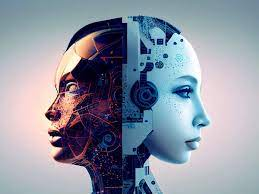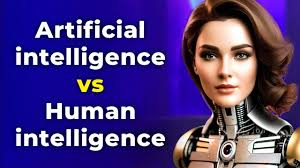AI Evolution : Past, Present, Future
Introduction:
Artificial Intelligence (AI) has undergone remarkable advancements in recent years, revolutionizing various aspects of our lives. This article delves into the journey of AI, exploring its past achievements, current applications, and the exciting possibilities that lie ahead.
Yesterday: The Emergence of Artificial Intelligence
The early days of AI saw groundbreaking research and pioneering developments. From the concept of artificial neural networks to the development of expert systems, AI researchers laid the foundation for what would become a transformative technology. Early AI systems focused on narrow tasks, such as chess-playing programs and speech recognition.
Today: AI's Ubiquitous Influence
AI has rapidly evolved and permeated various domains, transforming industries and daily experiences. Machine Learning (ML) algorithms, powered by vast amounts of data, have fueled significant breakthroughs. Today, AI is utilized in autonomous vehicles, natural language processing, image recognition, recommendation systems, and more. AI-driven platforms have become integral to our lives, streamlining processes and enhancing productivity.
AI in Various Fields
a. Healthcare: AI is revolutionizing healthcare, enabling early disease detection, medical imaging analysis, personalized medicine, and drug discovery. AI-powered chatbots and virtual nurses enhance patient care and provide immediate support.
b. Finance: AI-driven algorithms analyze vast financial data sets, optimizing investment strategies, detecting fraud, and enhancing risk management. Automated financial advisors offer personalized recommendations based on individual profiles.
c. Education: AI-based tools facilitate adaptive learning, tailoring educational content to individual students' needs. Intelligent tutoring systems provide personalized guidance, while virtual reality and augmented reality create immersive learning experiences.
d. Manufacturing: AI-driven automation and robotics streamline production lines, improving efficiency and quality control. Predictive maintenance systems minimize equipment downtime and optimize resource allocation.
Tomorrow: The Future Possibilities
The future of AI holds immense potential, with exciting developments on the horizon:
a. Enhanced Automation: AI will drive increased automation across industries, transforming workflows and eliminating mundane tasks.
b. Autonomous Systems: Self-driving cars, delivery drones, and smart homes will become commonplace, powered by AI technologies that enable them to adapt to complex environments.
c. Ethical AI: As AI's impact grows, there will be a heightened focus on ethics and responsible AI development. Ensuring transparency, fairness, and accountability will be crucial to address societal concerns.
d. Human-Machine Collaboration: AI will augment human capabilities, fostering collaborative relationships between humans and machines. Intelligent assistants will seamlessly integrate into our lives, providing support and enhancing decision-making.
Conclusion:
Artificial Intelligence has come a long way since its inception, with significant achievements and widespread adoption in various fields. As we move into the future, AI is poised to play an even more significant role, transforming industries, augmenting human capabilities, and addressing complex societal challenges. It is crucial to continue fostering innovation while ensuring the ethical and responsible development of AI systems to shape a positive future for humanity.







